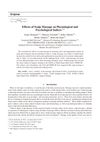 1 citations,
January 2013 in “Journal of S C C J”
1 citations,
January 2013 in “Journal of S C C J” Scalp massage reduces stress, increases relaxation, and improves blood circulation.
 1 citations,
October 1996 in “Journal of Cutaneous Medicine and Surgery”
1 citations,
October 1996 in “Journal of Cutaneous Medicine and Surgery” Gene therapy shows promise for treating skin disorders and cancer, but faces technical challenges.
 1 citations,
May 1965 in “Medical Clinics of North America”
1 citations,
May 1965 in “Medical Clinics of North America” Hair growth dysfunction involves various conditions with limited treatment options.

Hair analysis can help identify specific minerals and amino acids linked to various diseases.
 April 2024 in “Research Square (Research Square)”
April 2024 in “Research Square (Research Square)” Selenium supplements can help improve symptoms and metabolic markers in lupus patients.
 April 2024 in “Journal of cancer research and clinical oncology”
April 2024 in “Journal of cancer research and clinical oncology” Tissue-derived extracellular vesicles are crucial for cancer diagnosis, prognosis, and treatment.
 April 2024 in “Frontiers in pharmacology”
April 2024 in “Frontiers in pharmacology” Cynoglossum amabile has medicinal potential but poses safety concerns due to liver toxicity.
 March 2024 in “GSC Advanced Research and Reviews”
March 2024 in “GSC Advanced Research and Reviews” Different light affects cell functions and can help treat skin conditions.
 March 2024 in “medRxiv (Cold Spring Harbor Laboratory)”
March 2024 in “medRxiv (Cold Spring Harbor Laboratory)” Recent selection on immune response genes was identified across seven ethnicities.
 March 2024 in “Research Square (Research Square)”
March 2024 in “Research Square (Research Square)” Combining genetic and physical trait analysis improves diagnosis accuracy for monogenic diabetes.
 February 2024 in “BioMetals”
February 2024 in “BioMetals” Heavy metals like arsenic, cadmium, and lead can increase cancer risk and worsen outcomes.
 February 2024 in “PloS one”
February 2024 in “PloS one” Tofacitinib and adalimumab are promising treatments for cicatricial alopecia with few side effects.
 January 2024 in “Regenerative Biomaterials”
January 2024 in “Regenerative Biomaterials” Metal organic frameworks-based scaffolds show promise for tissue repair due to their unique properties.
 December 2023 in “Majalah Kedokteran Gigi Indonesia”
December 2023 in “Majalah Kedokteran Gigi Indonesia” Cinnamaldehyde helps bone healing initially but may slow healing later unless combined with DHT treatment.
 December 2023 in “Communications biology”
December 2023 in “Communications biology” Targeting the HEDGEHOG-GLI1 pathway could help treat keloids.
 December 2023 in “Curēus”
December 2023 in “Curēus” COVID-19 vaccination does not significantly increase the risk of developing alopecia areata.

Stopping minoxidil and draining fluid around the heart can save lives in rare cases.
 August 2023 in “Research Square (Research Square)”
August 2023 in “Research Square (Research Square)” Personalized thiopurine dosing based on NUDT15 genotyping can improve long-term outcomes for ulcerative colitis and Crohn's disease patients.
 August 2023 in “JOJ dermatology & cosmetics”
August 2023 in “JOJ dermatology & cosmetics” Antibiotics often cause skin reactions, making them a major health concern.
 August 2023 in “Physician's journal of medicine”
August 2023 in “Physician's journal of medicine” Hashimoto thyroiditis is an autoimmune disease that can lead to an underactive thyroid and is treated with medication and sometimes diet changes or surgery.
 July 2023 in “The Egyptian Journal of Hospital Medicine ”
July 2023 in “The Egyptian Journal of Hospital Medicine ” Alopecia areata is a hair loss condition caused by immune factors and can be treated with JAK inhibitors.
 February 2023 in “Asian journal of pharmaceutical research and development”
February 2023 in “Asian journal of pharmaceutical research and development” Flavonoids in Iraqi marshland plants have potential health benefits like antioxidant and anti-inflammatory effects.
 January 2022 in “International journal of zoology and animal biology”
January 2022 in “International journal of zoology and animal biology” Dogs with dermatomyositis, especially Collies and Shetland Sheepdogs, need better treatments for their skin and muscle inflammation.
 December 2021 in “Research Square (Research Square)”
December 2021 in “Research Square (Research Square)” Hair follicle sampling is a feasible method to measure FMRP and FMR1 mRNA levels in children.
 August 2021 in “Annals of pathology and laboratory medicine”
August 2021 in “Annals of pathology and laboratory medicine” Most skin tumors in the study were benign, with squamous cell carcinoma being the most common malignant type.

Tacrolimus causes fewer acute rejections than cyclosporin A in kidney transplants but doesn't necessarily improve kidney function after one year; cardiovascular risks and side effects vary between the two drugs.
 August 2019 in “Regenerative Medicine”
August 2019 in “Regenerative Medicine” In June 2019, the stem cell research field saw major progress, including new clinical trials, FDA approvals, and industry collaborations.
 July 2018 in “British Journal of Dermatology”
July 2018 in “British Journal of Dermatology” Mindfulness reduces anxiety and depression in skin disease patients; dermatologists and psychiatrists often lack confidence in treating psychodermatological conditions.
 April 2018 in “Journal of Investigative Dermatology”
April 2018 in “Journal of Investigative Dermatology” Acne patients' skin, both with and without lesions, shows a strong immune response and higher antimicrobial activity.































